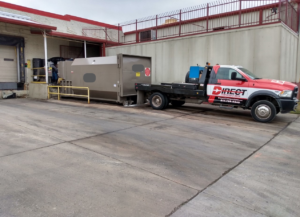The manufacturing industry, as well as the processing industry, produce a fantastic amount of solid waste. Any firm who sets out to manufacture physical goods, and/or process those goods, will find themselves swimming in a sea of garbage in no time.
If you are like most manufacturers who come to us, then you have been throwing money at your trash problems to make them go away. We get it. We support teams like yours ever single day. Unfortunately, we have found, that throwing money at a growing waste problem gets expensive fast. Every couple of months your trash hauler increases your rates little by little until you wake up and realize you are paying double for what used to be a smaller line item in your budget. Especially when you look up and find that your site has been paying for the same trash service with the same hauling partner for 10 years without asking any questions. The “throw money at it” solution is no longer solving your issue like it used to.

What can you do? Adding an additional trash or recycling dumpster does not work. The more cans you have the more your trash hauler can continue to charge. There needs to be a solid waste disposal strategy that takes your whole waste stream into account. How do we do that?
The first thing to do is to take recyclables out of your general waste stream. Any company who is not recycling is not just doing the planet a disservice but also their pocketbook. Recyclables like plastic, foam, cardboard, glass, etc. take up valuable space and weight inside your dumpsters. These overfilled cans are then hauled off by your trash hauler and you are charged by weight and/or load. If you decrease both the weight and the number of pick-ups for your general trash you will save money on your trash bill. A separate hauling partner called a recycler will pick up your recyclables. A recycler will generally pick up these items for free, or cheap, as these recyclables hold a value to the recycler for resale as a commodity. In some cases, as with cardboard, they will even pay you for what you give them. This means that not only do you save on the trash hauling but you can also make a little bit of money back dependent on commodity price.
A recycling program can be accomplished by implementing a baler or stationary compactor at each facility. A baler is a piece of equipment that you would install inside of your building to make bales of cardboard, plastic, etc. These bales can then be stacked out of the way until they are picked up. If you have larger amounts of recyclables, a stationary compactor, sitting outside a dock or connected to your building via a chute system, could be used. These allow for massive compaction ratios. You save a lot of space storing these recycled goods between pick-ups in bales or in their own stationary compactor where they can be compressed into tighter spaces. You set yourself up to have clean recyclables that make it easier to get paid for the raw materials you provide to your new recycler partner.
Now, assuming your recycling plan is in full swing, it is time to deal with your general waste. Much of a processing plant’s rubbish cannot be recycled. If it is food waste, there is an option for composting, but those systems have limitations. Also, there are other waste products that can’t be reprocessed cost effectively. To save money and space in your cans, instead of having dumpsters, we would recommend installing a self-contained trash compactor. These compactors are closed systems that gives you roughly a 4 to 1 compaction ration. Meaning you can cram 4 times the amount of waste into the compactor that you could into an equivalently sized roll off can. The compaction slows down how many pick-ups your need. It also almost eliminates your need for the dumpsters most companies rent from their hauling partners. The self-contained nature of these closed systems offer niceties like odor control, pest control, liquid run off assistance, and support for other undesirable side effects that come from the trash storage process.
So how much does this equipment cost?
That depends on what you need. It can range from a couple of thousand dollars to a couple hundred thousand dollars dependent on the use case and requirement. Some of your larger costs are shipping, installation, and repairs. Also, up time is one of the most important items in all aspects for manufacturing and processing plants. Without a dependable solution implementing new systems is generally a bad idea for any firm. Our industry leading equipment rental program allows you to have a single low monthly cost to plan for from a budget perspective. We take care of install, shipping, repairs, etc. Your team has a great piece of equipment saving you money and we help to ensure that you maximize your equipment uptime.
Give us a call today so we can come up with a specific plan for your needs! Our experts are here to support you.
2024 © Direct Compactor & Baler
This Website is LEGENDARY | All Right Reserved.
